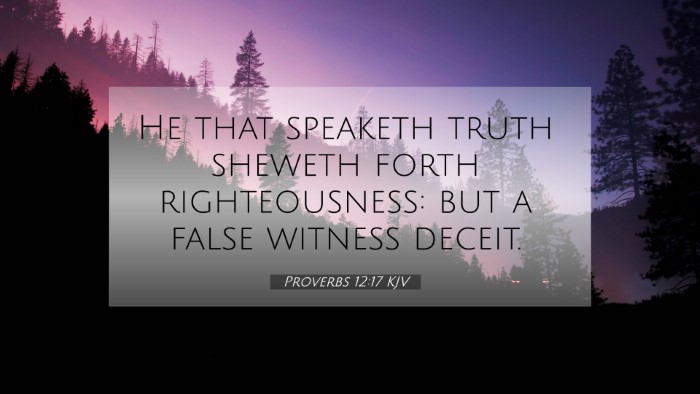Understanding Proverbs 12:17
Proverbs 12:17: "He that speaks truth shows forth righteousness: but a false witness deceit." This verse embodies the profound contrast between truth and falsehood, underscoring the importance of honesty in one's discourse. In this analysis, we integrate insights from various public domain commentaries to deepen the understanding of this scripture.
Verse Meaning
The essence of Proverbs 12:17 lies in the moral imperative of truthfulness. According to Matthew Henry, speaking truth is indicative of a righteous character. Truth is not merely about factual accuracy; it also encompasses integrity and moral uprightness. The righteous individual demonstrates these virtues through their words and actions.
As Albert Barnes notes, the latter part of the verse contrasts the truthful speaker with the false witness. The term 'false witness' carries significant weight in biblical literature, evoking the laws that forbade bearing false testimony. Such deceit not only harms individuals but also erodes the fabric of community and justice.
Adam Clarke expands on this theme by suggesting that truth-telling is a reflection of one's inner moral state. A truthful person is seen as someone whose words align with their reality, thereby building trust and fostering righteousness in their relationships.
Thematic Connections and Cross-References
Proverbs 12:17 connects with numerous biblical themes and scriptures that reinforce the importance of truthfulness. Some of the key cross-references include:
- Exodus 20:16: "You shall not bear false witness against your neighbor." This commandment highlights the ethical obligations surrounding truth-telling.
- Proverbs 6:16-19: "There are six things that the Lord hates, seven that are an abomination to him..." including a false witness who breathes out lies.
- Psalms 15:1-2: "O Lord, who shall sojourn in your tent? Who shall dwell on your holy hill? He who walks blamelessly and does what is right and speaks truth in his heart." This psalm echoes the core message of righteousness through truth.
- John 8:32: "And you will know the truth, and the truth will set you free." In the New Testament, truth is presented as liberating, aligning with the Old Testament's emphasis on its value.
- 1 Peter 3:10: "For whoever desires to love life and see good days, let him keep his tongue from evil and his lips from speaking deceit." This verse reminds believers of the practical implications of truthfulness.
- Colossians 3:9: "Do not lie to one another, seeing that you have put off the old self with its practices." This verse ties the ethical implications of truthfulness to the Christian life.
- Proverbs 14:5: "A faithful witness does not lie, but a false witness breathes out lies." This reiterates the critical importance of integrity in witness-bearing.
- James 3:14: "But if you have bitter jealousy and selfish ambition in your hearts, do not boast and be false to the truth." Here, the impact of underlying motives on truthfulness is explored.
- Proverbs 21:28: "A false witness will perish, but the word of a man who hears will endure." This highlights the fleeting nature of falsehood compared to the lasting impact of truth.
- Titus 1:2: "In hope of eternal life, which God, who never lies, promised before the ages began." This verse underscores the divine nature of truth and its ultimate significance.
Tools for Bible Cross-Referencing
To fully grasp the interconnectedness of biblical verses, one may utilize various tools and resources:
- Bible Concordance: A detailed index that helps locate words and their occurrences throughout scripture.
- Bible Cross-Reference Guide: These guides are invaluable for finding thematic connections between passages.
- Bible Reference Resources: Includes various Bibles that offer built-in notes on references, enhancing comprehension during study.
- Bible Chain References: A methodical approach to tracing concepts across scripture through linked passages.
- Cross-Reference Bible Study Methods: Strategies for integrating cross-referencing into regular faith practices.
Applying the Insights
Identifying Connections: When seeking to understand the connections between Old and New Testament scriptures, Proverbs 12:17 serves as a crucial point of reflection. The motifs of truth and righteousness resonate through several books, offering a holistic view of biblical ethics.
Comparative Bible Verse Analysis: Delving into the comparative study of Pauline epistles alongside Proverbs can reveal deeper insights into how truth operates within the framework of grace and law. Paul's emphasis on honesty in relationships echoes the wisdom presented in Proverbs.
In conclusion, Proverbs 12:17 stands as a powerful reminder of the moral weight of our words. Engaging with biblical cross-references not only enriches our understanding of truth but also reinforces the ethical foundations upon which our interactions are built. Utilizing tools for bible cross-referencing can elevate one's study experience, allowing for a richer exploration of God's word and the interconnected nature of Scripture.














